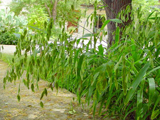Native Plants

Q. Who is Mr. Smarty Plants?
A: There are those who suspect Wildflower Center volunteers are the culpable and capable culprits. Yet, others think staff members play some, albeit small, role. You can torture us with your plant questions, but we will never reveal the Green Guru's secret identity.
Did you know you can access the Native Plant Information Network with your web-enabled smartphone?
Ask Mr. Smarty Plants is a free service provided by the staff and volunteers at the Lady Bird Johnson Wildflower Center.

rate this answer
Thursday - July 28, 2011
From: lackawaxen, PA
Region: Northeast
Topic: Water Gardens, Erosion Control, Shade Tolerant, Grasses or Grass-like
Title: Erosion prevention on shady Pennsylvania stream
Answered by: Guy Thompson
QUESTION:
I'm looking for a few species to plant along a stream channel to help reduce erosion during heavy rains. The soil is moist and in full shade. Ferns and thorny bushes are the only current vegetation under the oaks and beach trees. There are plenty of deer and other critters about that might complicate the choice.ANSWER:
Mr. Smarty Plants suggests that if you have a persistently wet area, consider Juncus effusus (Common rush), a species that will grow in water-saturated soil. I would plant the lower stream bank with sedges, which, unlike most grasses, will thrive in shade. Carex pensylvanica (Pennsylvania sedge) or Carex blanda (Eastern woodland sedge) should form a dense turf that resists soil erosion. Patches of Aquilegia canadensis (Eastern red columbine) at this level would provide color. A bit farther up the bank, I recommend Chasmanthium latifolium (Inland sea oats) and Parthenocissus quinquefolia (Virginia creeper). Either of these will produce a dense ground cover, with Virginia creeper remaining at ground level if there are no nearby trees or shrubs to climb. Flowering plants to consider include Campanula rotundifolia (Bluebell bellflower), Lobelia cardinalis (Cardinal flower), and Claytonia caroliniana (Carolina springbeauty). An understory small tree, Cercis canadensis (Eastern redbud) might complement the other species. If the upper bank is usually quite dry, Arctostaphylos uva-ursi (Kinnikinnick) will create a solid ground cover.
Check out this list of local suppliers for the species recommended above. Once established, these plantings should solve the problem of erosion threatened by both large and small storms. The ground covers and sedges are resistant to deer herbivory.
From the Image Gallery
More Shade Tolerant Questions
Shade loving plants with color for Irving, Texas
July 01, 2010 - Looking for shade loving perennials or annuals with color - native and low water. Live in Irving, Texas.
view the full question and answer
Shrubs for Shade in Annapolis MD
September 12, 2013 - Can you please recommend dense shade tolerant shrubs for Annapolis, Maryland.
view the full question and answer
Central Texas plants for dry partial shade
April 17, 2007 - I live in Austin Texas. My front garden area has rocky dry soil with intermittent sunlight and shade, maybe 2 to 4 hours of sunlight a day. Herbs do great. What perennial flowers (for some color) w...
view the full question and answer
Groundcover for foot traffic in dry shade from Prineville OR
May 12, 2013 - I live in central Oregon. I have an area under a large elm tree that slopes on all sides and has lots of foot traffic and no sun. (my kids have a swing in the tree and play around it a lot.) It's a v...
view the full question and answer
Grass for shady area
June 21, 2011 - I need to find a grass that can grow in a shady area, with some sun. Drought resistant and preferably native to the area. Would like to find a sod if possible. I know it's not a great time to plant n...
view the full question and answer
| Support the Wildflower Center by Donating Online or Becoming a Member today. |

